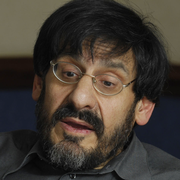
A FREQUENT theme as we prepare for the election is the "born free" factor: it is the first in which the generation born after 1994 is eligible to register and some of us insist that this will change how people vote. Registration figures are watched closely to see how many newly eligible voters sign up because it is assumed the African National Congress (ANC) may battle to attract their support.
All of which is likely to prove a distraction, as there is little reason to believe that the next generation will vote differently from its elders. The hype about "born frees" is more prejudice than sound analysis.
The most obvious reason for doubting the "born free" theory is that it probably has been disproved already.
People who had just reached voting age in our previous general election were three years old in 1994, yet they voted no differently from their parents. The "born free" theory assumes that people who do not remember apartheid will vote differently from those who do. But how many of us remember our first three years? The last round of new voters were not weighed down by memories of their infancy. Those who were eligible for the first time in our previous local government elections were aged one in 1994 — there is no evidence that they voted much differently from their elders.
This should not be surprising. Political attitudes are not only shaped by experience — they are also products of the influence of others. And those we are most likely to be influenced by are our elders. This ensures that there are no sharp changes in political attitudes between generations. It explains why, in older democracies, some regions have voted for the same party for 100 years or more — political loyalties are passed down from generation to generation. There is no reason our voters should be different.
There are two other reasons, both specific to this country, which suggest that the "born free" analysis is thinly disguised prejudice. First, those who peddle this theory do not believe that all newly eligible voters will break with their parents — no one is suggesting that the Democratic Alliance, Inkatha Freedom Party or Freedom Front Plus will lose voters born after 1994. So only one group of voters is likely to change its mind, presumably because they were not voting rationally but because they still remember apartheid.
There is no evidence any group of voters is less rational than any other. South Africans vote their identities — we tend to support parties who we believe speak for people like us. That is as true of whites as of blacks, of people in the suburbs as of those in townships or shack settlements. And so all our voters are likely to be strongly influenced by the previous generation. Theories that assume only some of us have been voting rationally are campaign speeches, not explanations.
Second, the "born free" theory assumes that people born after 1994 really are free in the sense that they have never experienced apartheid-era realities. This is either hopelessly naive or based on a very strong desire to avoid unpleasant realities. It is not an explanation of voting behaviour.
Anyone who believes that South Africans no longer care about race has not been paying attention: while we often speak to each other in code, similar racial attitudes to those of the apartheid period often lurk behind what we say to each other.
Nor have apartheid-era realities disappeared. Poverty and inequality are still pervasive and they take on a strongly racial form. New black voters next year will often experience very similar realities to those their parents faced two decades ago.
This is also not surprising — nowhere in the world has a change in political system ever ensured that the patterns of the past disappear in a generation: the past always lingers on long after the political rules have changes. We have not defied the laws of political gravity and so the after-effects of apartheid are still with us and will be for decades to come.
We can, and do, argue endlessly about why our racial divisions persist and about what we need to do to tackle them. But, whatever your view, it is unrealistic to expect a still racially divided society, in which most of those who were privileged in 1994 still are privileged and most who were disadvantaged still are, to suddenly produce a brand new set of voters with different views of the world.
Next year’s elections will probably see further shifts away from the ANC — its own documents acknowledge that many of its voters are unhappy and that it will have to work to retain their support. Whether it succeeds in persuading disillusioned voters to stick by it will be the key election story.
But, whatever factors shape voting patterns next year, the arrival of the first generation of post-1994 voters will not be among them. The similarities between the "born free" vote and that of the previous generation are likely to far outweigh the differences.
• Friedman is director of the Centre for the Study of Democracy.
http://www.bdlive.co.za/opinion/columnists/2013/11/20/theory-of-born-frees-rests-on-many-falsehoods
BY STEVEN FRIEDMAN, 20 NOVEMBER 2013, 05:34
